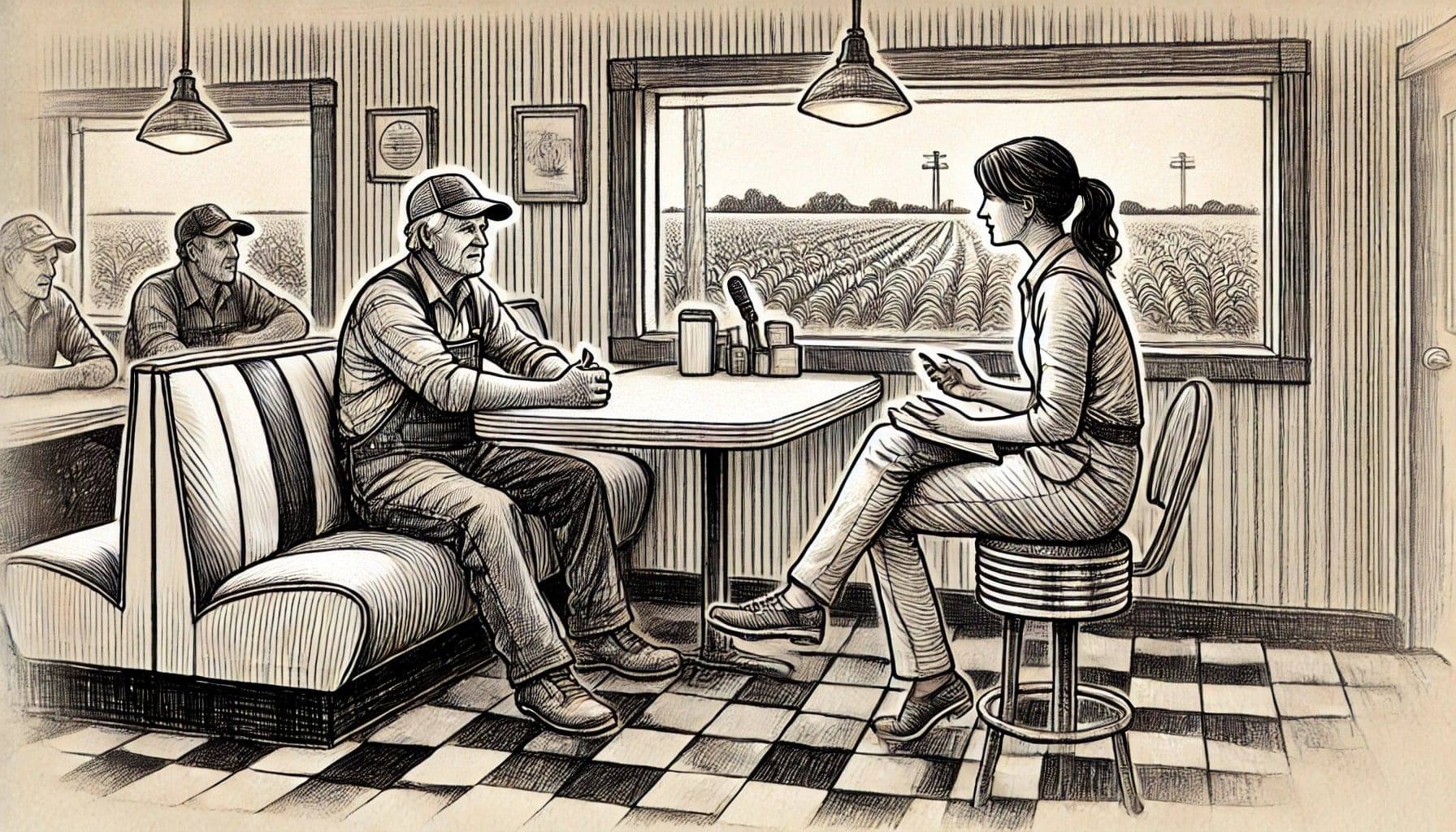Listening is greater than talking in journalism
In the wake of the shock election news from the US, a provocation for the future of journalism.

It’s one of those days, isn’t it, when every newsletter hitting our inbox has something to do with one subject: the new US president-elect? I even saw a travel newsletter riff on the theme: “America remains a great place for a holiday!”
OK. Sure.
And, let’s be honest here, this blog is not immune. But I don’t really want to talk about the orange man, his victory, what he will or won’t do to the media, and what the Democrats did wrong. Pretty much everybody else will be doing that, and I've been deleting predictable hot takes out of my inbox for the last 48 hours. I have other metaphorical fish to fry.
For example, I am interested to see if we’ll get a “Trump Bump 2” in media subscriptions, but we’ll have to wait and see on that one. (Investors seem to be expecting one…)
New Media > Old Media
But really, I’d like to riff a little on a couple of tweets or X posts or Musk droppings, or whatever we’re calling them today. One is from a British comedian and writer:
Also that new media is more powerful than old. It just is. And, as it happens, really thrives on hate.
— David Baddiel (@Baddiel) November 6, 2024
And the other from a young Democratic activist.
My takeaway from the results.
— Micah Erfan (@micah_erfan) November 6, 2024
It looks like America has shifted right… a lot. Some of this has to do with frustrations over inflation, sure, but I think there’s more here.
Democrats have been running campaigns the old-fashioned way, and I think we need to acknowledge that…
They both have a similar theme, don’t they?
This is the key passage from the second twee… X post (I will never get used to calling them that):
Most voters get their news through social media, and on social platforms, we are getting washed. Since 2015, Republicans have been building up their infrastructure to control the airwaves, and right now, they do. Their content gets more impressions on nearly every platform, and on YouTube and Spotify, it’s not even close.
The only way to fix this problem is huge investments in our digital apparatus. We need more creators and lots of them. We need our own Daily Wire, TPUSA, Prager U, equivalents, etc.
It's a good point. This wasn't the social media election, as Charles Arthur pointed out this morning. If anything it was the podcast election — or possibly the creator one.
The kerfuffle around the Washington Post’s non-endorsement of Kamala Harris, thanks to proprietor intervention, has been playing on my mind. Why? Well, firstly, because it highlights the failure of too many traditional media outlets to find a sustainable business model without a tech billionaire sugar daddy supporting them. You serve who pays you, and if your ultimate paymaster is a billionaire, at some point your interest and his will diverge. And then we find out how rigorous your editorial standards are.
But, secondly, I think it massively over-estimates how much power a newspaper endorsement carries these days. Would a Washington Post endorsement have swung it for Harris? Doubtful.
The media industry is obsessed with size. We’re still paying a disproportionate amount of attention to the big traditional media organisations, even those who are deeply unprofitable. And we’re not paying nearly enough attention to the vast shoal of mini-sites, of varying levels of audience and income, but whom are a principal source of information for many people. And that’s because examining that feels difficult.
These sites are diffuse, challenging to track, and lacking in, well, prestige. And we hate to admit it, but we're a bit status-obsessed in journalism. I might have trained people on many national newspapers globally — but I've never worked on one. And occasionally I'm reminded of that…
The New Media is not what we think it is

And once you do start looking at the vast ocean of independent media, you realise that it’s not just about websites, it’s about podcasts and newsletters and streamers and reels creators and so many other things, too. But this cornucopia of content providers is where new movements are born, and we’ve learnt that lesson multiple times. And then, we've promptly forgotten it again just as quickly. Repeatedly. We learnt it with Gamergate, and Brexit, and Trump 1, and now Trump 2.
Eight years ago, there was some great work done on the use of memes and other content designed for sharing. And what did we, as an industry, do with that research? Very little. I put it in my lecture slides, some students probably learned something from it. But beyond that?
It’s time for a change in the conversation around what journalism is. This isn't navel gazing. If you think resisting the global populism surge is a valid thing to do with your reporting, you need to make sure your publication — whatever its size — is connecting with people in the way those small, hyper-partisan sites, podcasts, and newsletters are. And that’s not going to be as easy for us as it is for them. It’s much harder to create that same sort of emotional bond, when you’re restricted by talking about what’s actually true.
Forging the bond
And, of course, if you want to forge those bonds, you need to actually connect with people again. The problem with the consolidation of traditional media into a handful of national or international players is that vast swathes of the population almost never meet a journalist. There may well be more journalists in a few square miles around London than there are in the rest of the UK put together.
The collapse of local media in the rest of the UK, and critically in the much-derided “flyover” states in the US (a term that has largely vanished from the lexicon in the past eight years, but whose underlying reality most certainly has not) has left us with a largely urban journalistic class, whose interests are often very different from those of the public at large.
There’s a certain class of commentators who has been banging the drum that the media in the US should have been telling people who Trump really is. The reality is that they have been. It’s just that the public don’t care — or don’t listen. And maybe because we’re not listening to them. Something has gone very wrong in the discourse around journalism when we’re talking more about what we should be telling people, and not about listing to them.
Journalism is about listening.

If we did more reporting around the real life issues that impact people day-to-day, if we took the concerns of the vast swathes of the public we never talk to more seriously, If we found our what they want reported on and do it diligently, and with a focus on the truth, whatever the political implications of that truth, then maybe they’d be more inclined to listen to us.
I'm not terribly interested in the latest hot take from an opinion writer about why the Great Orange One won. I'm deeply interested in reading detailed reporting about the people who voted for him, their motivations and their concerns. It may be that well over half the US population is irredeemably racist, sexist and xenophobic, as some are suggesting. But I doubt it. That feels like the easy answer, almost a comfortable answer, as it excuses people from any blame in a result they dislike. Surely it's the role of journalism to look beyond the easy answers to the challenging complex ones beneath?
The current state of journalism often feels like an existential fight for financial survival. And that can blind us to how badly broken the relationship between the profession and the average person is. They never meet journalists, they never talk to journalists, so why would they care about them? And, critically, why would they trust them? How easy it is for unscrupulous politicians to sow distrust when they see the politicians more frequently than the journalists.
The new wave of media influencers, podcasters, and personalities has based their success on a mixture of relatability and aspiration, and there’s enough micro-influencers around that most people know someone on that scale. Hardly any people can say that about journalists.
Bring back the beat
In the end, the only way we’ll pull back from this model is to have fewer journalists spending all their working days in an urban office block, typing away at their desks. Instead, we need more of them finding ways of connecting with the public again. And yes, that means more shoe leather journalism. And yes, that means more community engagement with your journalism, both in person and online.
And that might mean very different approaches to how we work, where we have our offices, and how we manage teams — and even how we produce and publish our journalism.
We had a warning eight years ago. We’ve had a reminder again now.
Let’s listen this time.





